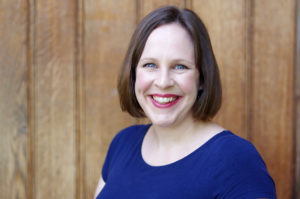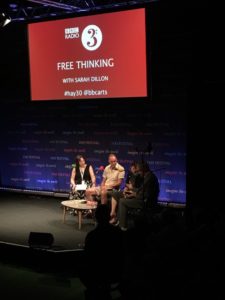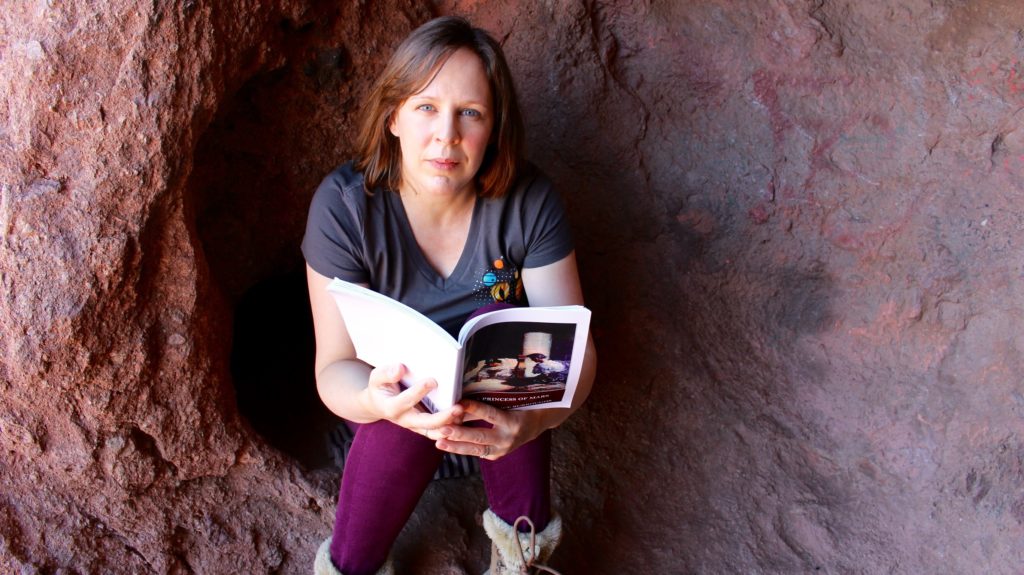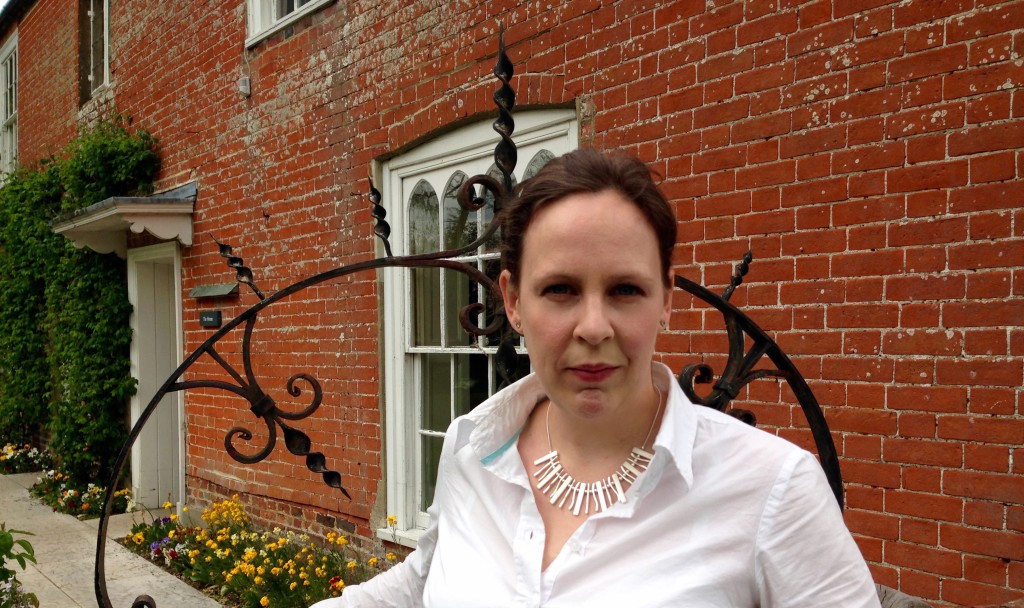Literary Pursuits returned to the BBC Radio 3 airwaves in July with Episode 5 on E. M. Forster’s secret book Maurice. With the Forster archives on my doorstep at King’s College Cambridge, I didn’t have to travel far for this one, but the book itself had a remarkable journey from Cambridge to America, passed hand to hand by men risking imprisonment to transport it from Forster to Christopher Isherwood. I start with this journey in order to discover the wonderful and moving story behind this seminal text in the history of gay literature.
Hey Hay!
On Sunday 28th May, I had the pleasure and the privilege to present a special edition of BBC Radio 3’s Free Thinking programme – Writing and Rewriting the Past – live at the Hay Festival, as part of the BBC’s line-up for the 2017 event. Sebastian Barry, Jake Arnold and Madeline Thien joined me to talk about historical fiction in the age of “alternative facts”. It was a deeply stimulating, sometimes moving, discussion, with all in agreement that Madeleine stole the show. If you haven’t read her novel, shortlisted for the 2016 Man Booker Prize and 2017 Bailey’s Prize for fiction, Do Not Say We Have Nothing, go and seek it out now – you’ll be glad you did. The programme was broadcast on Thursday 1 June at 10pm on BBC Radio 3 and is available here as an Arts and Ideas download.
‘Seeing is Believing’, ‘We Are the Martians’ Episode 1, 11am Monday 6th March, BBC Radio 4
The arrival of Spring sees Radio 4 go into full Martian mode for a festival week celebrating the red planet. To kick things off I’m presenting the first of three documentaries on our scientific and literary imaginings of Mars…Come with me to Mars. A planet we have been been dreaming and writing about for centuries. From the Old Mars of canals and fantastic beasts, to utopias projected by feminists, bolsheviks and even druids. You can have any Mars you want, at least until we get there and Mars is finally terraformed and settled as a new Earth. Join me for Seeing is Believing – the first episode in a three part series, We Are the Martians – on Monday 6th March at 11am on BBC Radio 4, and available to listen again on the BBC iplayer.
And so I’m back, from outer space…
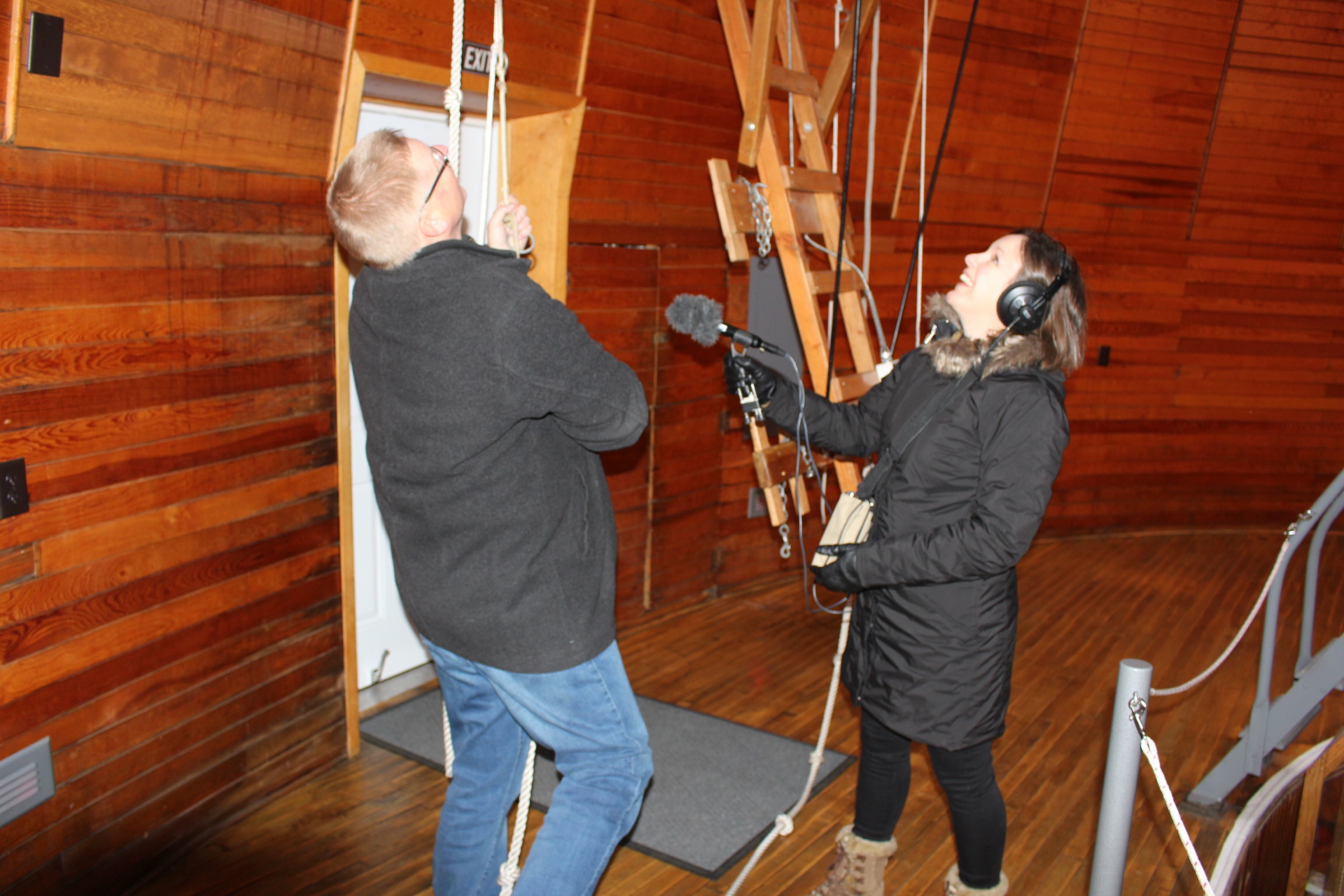
On location, Lowell Observatory, Flagstaff, Arizona. A rare moment of getting to hold the kit for a photo op as the roof of the observatory is opened.
After 6 months in solitary academic confinement, and with The Book triumphantly written, the beginning of 2017 has seen me return to life beyond my study with renewed enthusiasm and vigour. I’ve spent the past few months steeped in the Martian imaginings of our greatest writers and scientists for a BBC Radio 4 documentary on mankind’s romance with the red planet, for which I had the great if exhausting pleasure of a weekend trip to Mars’ Earth analogue, Arizona. We visited Percival Lowell’s Flagstaff observatory to learn more about how it all began, and then descended to Phoenix to talk about where we are now, with contemporary Mars scientists at Arizona State University. There may also have been a morning spent barsooming around the Arizona desert – as close to Mars as I’m ever going to get – imagining encounters with magnificent and fearsome six-limbed Tharks. And if that sounds a little frivolous, I can assure you that it was actually very illuminating: standing on red rock, looking across the barren desert to the dust clouds on the distant horizon, it suddenly made sense why that landscape inspired the original literary visionary of Mars – Edgar Rice Burroughs – whose experiences on those plains and encounters with their native inhabitants shaped his Martian imaginings. The programme will be broadcast as part of Radio 4’s Martian Festival at the beginning of March – more details to follow.
I also had the pleasure this week of a stimulating hour’s conversation with SF writers Roz Kaveney and Aliette de Bodard for an episode of Radio 4’s Beyond Belief on religion and science fiction, which will be broadcast on Monday 13th March. And, to knock a little realism into me, next month I’ll start recording my new series of Literary Pursuits by investigating the story behind the story of E. M. Forster’s posthumously published Maurice. Fortunately, neither interplanetary nor transatlantic travel is necessary to get started on that investigation, since a treasure trove of Forster’s papers sits on my doorstep in King’s College Cambridge’s modern archives.
BBC Radio 3 Proms Extra Events 2016
My academic work is top priority at the moment as I’ve gone into research lock-down in order to get my long-delayed second book drafted by Christmas. But it’s been a pleasure to treat myself to a break from the book to take part for the second year in BBC Radio 3’s Proms Extra events: live discussions that take place before the Prom and are then cut for broadcast during the interval of the evening’s concert. On Saturday 6th August 2016 I’ll be joining eminent science fiction novelist Stephen Baxter to talk with fellow New Generation Thinker Will Abberley about H. G. Wells and the lasting relevance of his work, especially The War of the Worlds. Then on Thursday 18th August I’ll be back in the presenter seat – a role I now enjoy even more than being a contributor – to interview the great Michael Pennington about what it’s like to perform Shakespeare and how the Bard himself portrayed the profession he knew best. All events are free and there’s one before every Prom, so plenty to choose from – if you can’t make it in person, both the Wells and the Pennington discussions will be available on Radio 3’s Arts and Ideas section of the BBCiplayer after broadcast. While you’re online, check out the new addition to the Proms season, fantastic comedian Vikki Stone‘s new behind the scenes podcast, Proms Unplucked.
Literary Pursuits Returns to BBC Radio 3
The third and fourth episodes in my literary detective documentary series for BBC Radio 3 – Literary Pursuits – will be broadcast to bracket the Hay Festival at 6.45pm on Sunday 29th May and Sunday 5th June. Episode 3 investigates the story behind the posthumous publication of Jane Austen’s Persuasion whilst episode 4 travels to Dublin to unravel the mystery behind a singed proof copy of James Joyce’s Dubliners, dated 4 years before the book’s publication. In previous episodes I investigate Charles Dickens’ Great Expectations and Jean Rhys’ Wide Sargasso Sea. All the episodes in the series can be listened to on the Literary Pursuits page of the BBC iplayer and my thoughts on the series can be found here.
King’s Fantastic Talks Series: Faber
BBC Academy Blog: From Boffin to Broadcaster
In March 2016 I was invited to give a talk to auditionees for this year’s AHRC and BBC Radio 3 New Generation Thinker scheme, the scheme that launched my career in broadcasting back in 2013. At the same time, I received an invitation to write a blog for the BBC Academy website on my experience of working in both academia and broadcasting. The result of the talk I gave to the NGT hopefuls is this blog on the challenges and rewards of what has turned out to be a most delicate balancing act.
Why Close Reading? Series 2 begins on BBC Radio 4’s Open Book
The second series of my Close Reading feature on BBC Radio 4’s Open Book has kicked off in 2016 with two readings of novels about as different as can be. In the first episode, I try to figure out if you can close read comedy without taking all the fun out of it – my case study is Stella Gibbons’ comic classic, Cold Comfort Farm. In stark contrast, in the second episode, I take on J. M. Coetzee’s disturbing novel Disgrace, looking at how point of view in the narration of a rape reveals the ideas about complicity and denial at the heart of the novel. The series will continue over the next 6 months with episodes on Raymond Chandler’s The Big Sleep and Toni Morrison’s Beloved next in line. If you want to catch up with episodes from Series 1, they’re all gathered together on my BBC Close Reads page.
Since the first Series, I’ve had lots of conversations with people about close reading and why I believe it’s such an important way to approach literary texts both inside and outside the academy. So I thought with the launch of the second series it might be a good time for a blog making my case…
When I turned 16 my Dad gave me a copy of The Collected Dorothy Parker and I fell in love. She’s just brilliant. Parker’s very well known on the other side of the Atlantic, but not so much over here. When I introduce her to people I describe her as a kind of American Oscar Wilde. She’s very funny, darkly so. She’s perhaps most famous for her aphorisms that slip off the tongue but slice their targets – the one I always remember is ‘That woman speaks eighteen languages and can’t say “No” in any of them’.
Parker’s writing, like Wilde’s, is perfect, shinny, and smooth. What we see in it is a brutally honest reflection of ourselves and our societies. So she’s a very interesting example in relation to close reading. Because close reading requires depth. In any first reading, you skip along the surface, you’re drawn in by the plot, the emotion, the characters. You read quickly and you are absorbed. If a book doesn’t do that to you, it’s not working. And many people, to be fair, are happy to stop there. But I don’t think everybody is, or at least not all the time. And don’t think it’s just academics or students that want or need to know more, that say, ‘Hold on – this book’s made me laugh, or made me cry, or kept me riveted all night when I should have been asleep. How did it do that? How did words, just words, make me feel like that?’.
And that’s where close reading kicks in. You go back, and you go slowly. You look at just one passage, sometimes even just one line. And you get everything you can out of it. Which words have been chosen – why those exact ones not other ones? How have they been put together? Is there repetition? Is there emphasis? Who’s speaking? Whose thoughts do we have access to? There’s almost no end of these type of questions. But if you ask them, if you keep asking them, at some point, there’s this kind of moment, like twisting a kaleidoscope, when you see the pattern. And that moment is like discovering how a magic trick’s done. Suddenly, you understand, or at least you start to understand, how the book made you feel the way it did. And, even more importantly, you understand how the smallest detail is connected to the largest theme. And that’s really exciting. The book takes shape for you in a way that it hasn’t done before. Close reading exposes its workings – it’s like seeing a really complex clockwork mechanism with the front taken off. But that doesn’t ruin it for me. Because you don’t stop there. You go back and read for a third time and on that reading you’ve got the combination of the speed of the first reading, and the insight of the depth of the second close reading. And that third reading is something truly special.
‘A third reading?!’ I hear you exclaim in disbelief. Yes, why not. I know we’re all busy, that our lives are scheduled from morning to night. But that’s another reason why close reading’s important – it’s almost a kind of political act. It stands against the urgent speed and constant movement of contemporary life. It says no, there is power, there is benefit in going slowly, in reading closely and carefully. When Ali Smith was on Open Book in September 2014, she made exactly that plea for her own work – take time with it, she said, and it will nourish you.
Close reading also nourishes the writer, because it gives credit where credit is due. Just like magicians, writers don’t really want you to see the labour that’s gone into their work – it wouldn’t be enjoyable, it wouldn’t be working its magic, if you could. Ernest Hemingway said ‘it’s none of their business that you have to learn to write. Let them think you were born that way’. But at the same time writers actually do want you to know that – because they work really hard to get their prose just right, to get the exact effect they’re aiming for. Dorothy Parker’s prose for instance, shows no sign of effort, but in fact she edited and edited to get it that way: ‘I can’t write five words but that I change seven’ she said. Close reading is a compliment to writers – it’s saying, ‘You spent time on this, so I’m going to spend time on it too’. And that’s pleasurable and rewarding for both readers and writers.
New BBC Radio 3 Sunday Feature Documentary Series: Literary Pursuits
My scholarship and my creativity have been put to a new test over the past 6 months as I’ve been making the first two episodes in my new Sunday Feature Series for BBC Radio 3: Literary Pursuits. I think radio and television confront a real challenge when it comes to literary broadcasting – how do you avoid succumbing to the cult of the author and actually stay in contact with what people really love and want to hear and know about: the text?
Academically, I was schooled in Cambridge practical criticism and poststructuralist literary theory – a not incongruous combination since both approaches hold that the text alone is a sufficient object of study, that the words on the page, if paid close enough attention to, tell you everything you might want to know. Of course, these are just two schools of thought amongst the many approaches one finds in academic literary criticism: historicism places the text within its cultural context of production; biographic criticism reads it via its connection with the author’s own life; the study of material texts looks at what we can learn from the physical histories of texts as they move from the first handwritten jottings, through annotated typescripts to final published versions (with many stages in between). If you were to pick up any introduction to literary criticism and theory, you might be forgiven for thinking that these approaches are mutually exclusive, that never the twain shall meet. But as I’ve moved further along in my career, I’ve realised that some of the most powerful literary criticism combines two or more of these approaches. That all of them alone, but more so in combination, can open up works of literature in revelatory ways.
Having come to that conclusion in my academic work, I was delighted to be given the opportunity to try out this idea in broadcasting. What would a radio programme look like if it, too, combined these seemingly different approaches to texts? Could we take a great work of literature and weave together close attention to the themes as well as to the style, form and technique, with investigation into the author’s life and times, and archival research into the book’s textual history? Yes, I thought we could, but how could we do all that and meet the cardinal rule of radio broadcasting – telling a good story?
That’s where the genius of my producer came in – we would turn it into a detective story. So that’s just what we did. In my Literary Pursuits episodes I start with a mystery that I want to solve: in the first, it is why did Charles Dickens change the ending of Great Expectations, right at the last minute?; in the second, it is why does it take nearly a quarter of a century for Jean Rhys to publish Wide Sargasso Sea? Each of these mysteries sets me off on a quest to find out the story behind the story, to follow the clues to discover how great works of literature were written. And of course, those clues are thematic, stylistic, biographical, historical, material and more – all of these diverse literary critical methodologies become my investigative tools, and all are needed to solve the textual mystery.
I have learnt so much over the past six months, about the joys of working closely, creatively and collaboratively with a brilliant producer, but also about these two works of literature which I thought I already knew so well. The Great Expectations episode was picked out as a choice of the day for Sunday in this week’s Radio Times, and the Series is featuring in the radio review section of The Times on Saturday. So it definitely seems to have caught the imagination of some journalists out there. When it’s broadcast, I hope it brings as much pleasure and knowledge to its listeners as I had and gained making it.
The new page for the Series is here, where you can also listen back to episodes via the BBC iplayer if you miss the first broadcasts. It begins with Great Expectations on Sunday 10th January, followed by Wide Sargasso Sea on the 17th. Enjoy!

